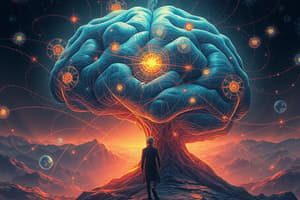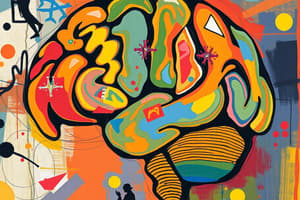Podcast
Questions and Answers
What is the Reminiscence Bump related to?
What is the Reminiscence Bump related to?
Which theory suggests that cultural narratives influence how we remember life events?
Which theory suggests that cultural narratives influence how we remember life events?
In the context of categorization, what does the term 'semantic networks' refer to?
In the context of categorization, what does the term 'semantic networks' refer to?
Which of the following options describes a limitation of flashbulb memories?
Which of the following options describes a limitation of flashbulb memories?
Signup and view all the answers
What is the primary focus in the study of Chomsky's theory of language?
What is the primary focus in the study of Chomsky's theory of language?
Signup and view all the answers
What is the primary concept behind the 'Wug study'?
What is the primary concept behind the 'Wug study'?
Signup and view all the answers
Which phenomenon describes the effect where previously learned information interferes with the recall of new information?
Which phenomenon describes the effect where previously learned information interferes with the recall of new information?
Signup and view all the answers
What is one significant finding regarding bilingualism in the context of language systems?
What is one significant finding regarding bilingualism in the context of language systems?
Signup and view all the answers
Study Notes
Everyday Memory (Chapter 8)
- Autobiographical memory includes transition points, reminiscence bump, self-image theory, cognitive theory, and cultural life script theory.
- Emotion plays a role in memory; flashbulb memories are more confident but not necessarily more accurate.
- Memory is constructive, not a direct recording of events.
- Source monitoring errors happen.
- Schemas and scripts influence memory.
- Retroactive interference and misleading post-event information can lead to false memories.
Knowledge Chapter 9
- Memory categorization is examined using definitional, prototype, and exemplar approaches.
- Categorization is hierarchical, using super-ordinate, basic, and sub-ordinate levels.
- Individual experience impacts categorization role.
- Semantic networks (nodes) and cognitive economy affect how we process information.
- Lexical decision tasks reveal how we access stored information.
- Spreading activation reveals how mental concepts are linked.
Language Chapter 11
- Language is viewed from classical, behaviorist, and cognitive perspectives.
- Language has generative and dynamic aspects.
- Language involves perception and production.
- Language analysis includes phoneme, morpheme, and word levels.
Studying That Suits You
Use AI to generate personalized quizzes and flashcards to suit your learning preferences.
Related Documents
Description
Explore the psychological concepts of memory and categorization in this quiz covering Chapter 8 and Chapter 9. Understand how autobiographical memory works, the influences of emotion, and the methodologies of categorization. Dive into cognitive theories and how they relate to individual experiences and memory errors.




